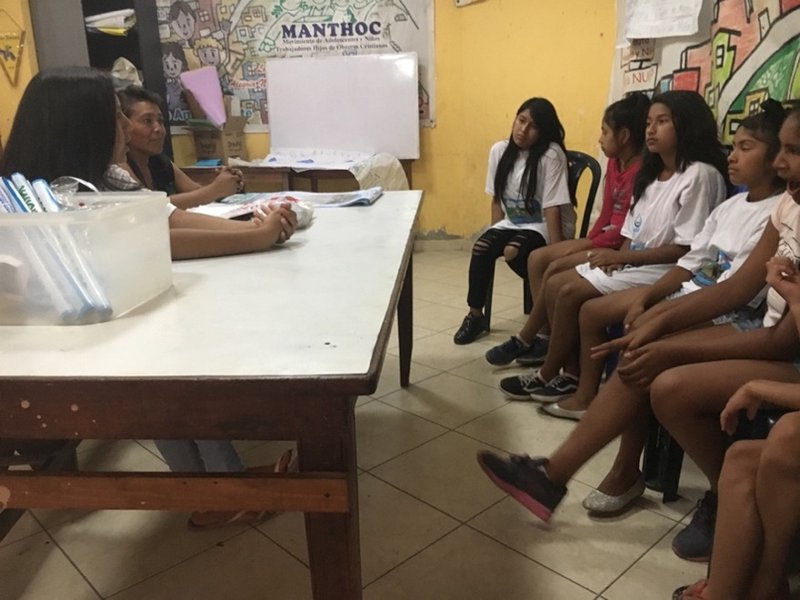Where is the solidarity for working girls?
 | ||
| A girl sells candy to drivers in Lima, Peru | ©Reuters |
MANTHOCas, as the girls of the social movement are known, consider themselves proud working children and want to be heard on all matters that concern them, from their legitimacy as workers to the disappearance of drinking water. Yet in many ways they face more adversity than their male peers. Their gender largely relegates them to domestic and care work, and Peru’s history of social conservatism has forestalled changes to sexual and reproductive education, such as removing gender ‘ideology’ from the national curriculum, which has fundamentally altered their lives. At the same time, girls and women continue to fall prey to femicide with little to no repercussions for the male murderers. The more experienced children at MANTHOC try to teach members to break away from such thinking and create change where they want to see it, but the girls continue to face a hard life outside its doors.
It is important for members of adult society to assist working children by acknowledging their work and supporting them in it.
I found that girls’ entry into the movement was not solely for concrete benefits like getting tutored, receiving a hot meal, or being in a safe space. It was also a way to access nonmaterial resources like play, friendship, and a sense of belonging. Community is important in MANTHOC, and relying on it for support is one of the ways the girls overcome difficulties in the broader patriarchal society.
Solidarity in work, solidarity in life
Allow me to tell a story of an initiative that demonstrates how inter-generational solidarity at MANTHOC works in practice, even when it seemingly falls short. At one point during 2018, MANTHOCas decided to visit a public secondary school to educate the students on the meaning of World Water Day. They were concerned that people were wasting dwindling drinking water, and the girls wanted to reach out to their community and move the issue to the forefront of their minds.
The action did not go as planned. They were allowed into the classroom but the students refused to give them a hearing. They looked disgusted when they returned and averted their eyes when Alexandra, the 14-year-old who had coordinated the initiative, encouraged them to reflect on what had just happened. “We have already done the action, it’s time for evaluation,” she said. “What things have been done well? What things can be better?” The girls sat across from her in silence. Stepping in to assist, their adult collaborator Susana adapted Alexandra’s words to encourage the girls:
“If we don’t evaluate and ask, ‘how did it go in the activity?’, we will never know if we are truly doing it right. ‘Will this cost us anything?’ ‘What did we look like?’ ‘What happened [there]?’ ‘What is our suggestion [for next time]?’ So that in the following activity, we recall all of [these questions] and do it [differently].”
As an adult collaborator, Susana was in charge of the daily functioning of this particular group of girls. She fulfilled many jobs in the social movement, including, as she did here, bolstering the child leader’s position when necessary. As an adult woman, she was also able to offer the group the benefit of her experience, and the girls respected her because she deferred to their knowledge in return. Adult reinforcement for MANTHOC comes in many forms, including volunteering in or collaborating with the organisation, offering them financial support, or speaking up in support of them and working children as a whole. At this moment, it came through Susana uplifting the spirits of the girls who appeared sullen and dejected after a difficult set of public presentations.
 MANTHOCas during their post-action evaluation | Photo by author. All rights reserved
MANTHOCas during their post-action evaluation | Photo by author. All rights reservedSusana informed the MANTHOCas that no matter how effective or ineffective an activity is, there is always room for improvement. “The point is not to say, ‘you have done it wrong,’,” she said. “Instead, [ask] ‘how did this go for us?’, ‘how did we feel about it?’” The girls began to nod. Susana continued:
“We express ourselves here. But maybe, in other spaces with friends in other groups, who may be older than us…some of us perhaps sacrifice expression. I know it. But here, we want to be able to have the capacity to say how we feel, so that our meaning is fulfilled.”
Rasa, 11, was the first to speak. She said she felt embarrassed because the classroom students had been conversing while she spoke. Sayuri, 13, and Mia, 11, spoke of frustration, disrespect, and nervousness after being introduced to the class. Esperanza, 12, chuckled about how the teacher was not even aware that it was World Water Day. She said she felt vindicated knowing more than him. The girls began to feel better.
It’s time to take working children seriously
The MANTHOCas’ activity on World Water Day did not turn out as they had anticipated. However, their capacity to struggle and evaluate themselves grew, which is important to their overall development as participants in society. As Susana boosted the MANTHOCas’ spirits, adults in broader society must consider how they too can assist working girls. Right now, with growing poverty and an ongoing pandemic, it is important for members of adult society to assist them by acknowledging their work and supporting them in it. Whether it concerns potable drinking water, reporting gender-based violence, or allowing dignified work under the age of 12, we have a collective responsibility to do what the secondary school teachers and students on World Water Day did not do: Listen.
Comments
Post a Comment
If you are a member of XUNICEF, you can comment directly on a post. Or, send your comments to us at xunicef.news.views@gmail.com and we will publish them for you.